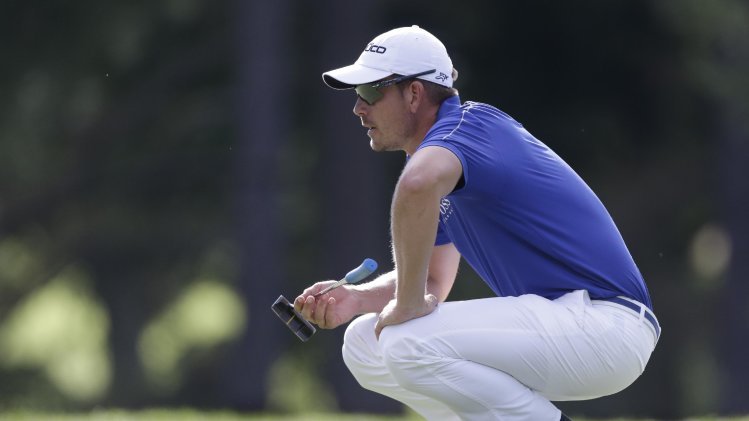ROCHESTER, N.Y. – There was a little Ziploc bag waiting for Jason Dufner in the car on Sunday evening.
When his wife, Amanda, got to the course in the early afternoon, she left it in there, to be taken home to Alabama after the PGA Championship was over.
Inside the bag were a handful of acorns gathered from the Oak Hill Country Club. On Thursday, Jason slipped them into her hand and said, "Here are some acorns; keep finding 'em." She did so, and placed them into a refrigerator for the weekend. The couple would take them back to their 50 acres of land and plant them, and maybe a mighty oak would someday stand.
"Hopefully," Amanda said Sunday, "one of 'em will survive."
While the acorns sat and waited, Dufner walked up the most picturesque hole on the golf course Sunday. It's the 13th, known as the Hill of Fame, because many of the oaks there have plaques with names of men and women who have contributed significantly to the game of golf. Names like Dwight Eisenhower, Tom Watson, Babe Zaharias.
Dufner walked past all those oaks as the sun began to set, charging up the hill with thousands of people watching in rapt attention. He didn't smile or wave – he never seems to emote at all on the course – but it was clear what was happening amidst the trees. A man's tiny dream was growing big.
Dufner was impenetrable here at Oak Hill, fending off nerves and his own history of major failure to complete one of the prettiest finishing rounds you'll see in a major championship. Two years after blowing the PGA Championship in Atlanta, Dufner grabbed it like it was his 10th rather than his very first. Dufner shot a 68 to win on Sunday, finishing 10-under par and two strokes clear of a field that surely thought the leaders would give something back on championship Sunday. This leader did not. It was loud all around him, yet his air was quiet – a man locked deeply in his own focused mind.
Dufner would likely have won more tournaments by age 36 if it weren't for his putter. Inside of five feet, he's one of the worst on Tour statistically. And on Sunday, when faced with a three-footer on the very first hole, his anxiety spiked in a way that is never apparent on his face. He made the putt, and he began to relax.
Then he let his irons do the work. And those iron shots are a sight to behold. Every single one appears effortless – a white tracer against a blue sky, almost like a firework that hangs there and doesn't detonate.
"Few people like him come along," says longtime friend Nick Malinowski, who played on the Nationwide Tour. "Few people control a golf ball the way he does."
Jim Furyk played superb golf all afternoon in that final pairing, but he couldn't get close enough to the pin to make birdies. Dufner, though, seemed to land just about everything so close that his traditional putting issues weren't a factor. He went 27 straight holes without a bogey on one of the most challenging courses in the world. He hit 75 percent of his greens for the tournament.
So many of these majors come down to someone's error. Not this one. Dufner entered the final round a stroke behind Furyk, made up the deficit with a birdie on the fourth hole, took the lead with another birdie on the fifth and never gave it up.
Dufner won this major far more than Furyk, who shot 71 on Sunday, lost it.
It was won, appropriately, with one of Dufner's approach shots. On 16, only moments after tossing a ball to 14-year-old Dallas Antonio in one of his only interactions with fans all day, Dufner lobbed an iron shot to within a foot-and-a-half of the cup. At that point, there was no drama left other than whether the Cleveland native would actually show an expression other than that Jason-Dufner-is-not-impressed gaze. He had a small celebration when he tapped in to win, and he grinned afterward, but the more visible show of emotion came from Amanda, who welled up more than once in the moments after the victory.
Standing on the 18th green after the trophy presentation, Malinowski was asked why Dufner always looks so …
"Melancholy?"
Yes. Melancholy. The man looks distant, even depressed.
"Even when he's doing things that would call for it, he's not emotional that way," Malinowski said. "He knows he's only here for so long and the game is bigger than him."
And everything that Malinowski and Amanda have said about Jason Dufner this week points to that. He loves the history of the game and the perspective it takes to excel at it. He's reduced it to a knowable science: "Golf is a little more boring [than the other major sports]," he told reporters Sunday. "You either hit it on the fairway or you didn't. You either hit it on the green or you didn't." All he did this week was hit it on the fairway and hit it on the green. It was the perfect show of respect for this great course and those who have played on it before. Dufner wasn't ever beaten down by this course, and he was never above it either. He was ofthis course, aligned with it.
Now there will be a plaque on this course with his name on it. He is part of the history he so cherished.
"My name will always be on this trophy," he said, "and nobody can take that away from me."
Jason Dufner will always have that trophy. He'll always be a major champion. But it's likely he'll be even more proud of the acorns he took from this place, and how one of them will grow into something special that will live long after he's gone.



